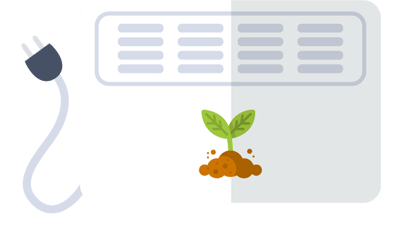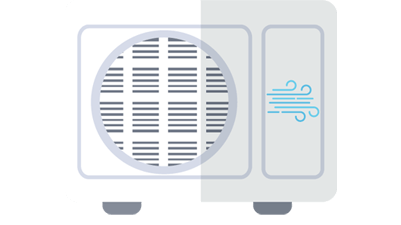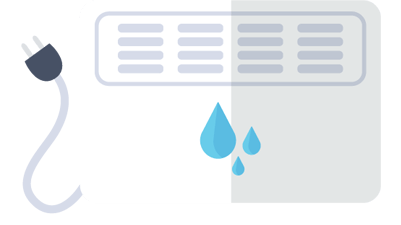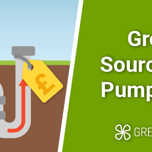Answer these simple questions and we will find you the BEST prices
Which type of solar quotes do you need?
It only takes 30 seconds
100% free with no obligation

Get up to 4 quotes by filling in only 1 quick form

Install a heat pump for less with the BUS grant

We’ve helped over 500,000 homeowners reduce their carbon footprint
- GreenMatch
- Heat Pumps
Complete Guide to Heat Pumps in the UK (2024)

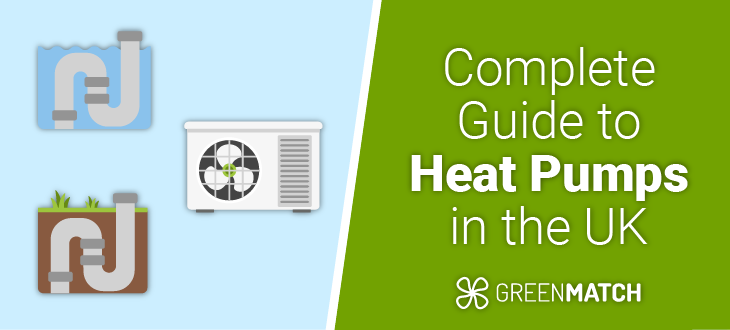
- A heat pump transfers heat from a cool space to a warm space by circulating refrigerant. To heat, it extracts heat from outside and releases it inside; to cool, it extracts heat from inside and releases it outside.
- Heat pumps are cost-effective, low-maintenance, and safer than combustion systems. They efficiently convert energy into heat and cooling, reducing carbon emissions.
- The UK's Boiler Upgrade Scheme incentivises their adoption with up to £7,500 for installations.
- By replacing your old electric storage heater with a heat pump you could save up to £1,200 annually on your energy bills.
Heat pumps are heating and cooling systems that can save you up to £2,000 on your annual energy bills. Interested in reaping these financial benefits? Then stick around to find out what kind of heat pumps there are, how they work, how much they cost, and the kind of savings you can expect from a heat pump installation.
Before we go into detail, let’s take a quick look at some of the questions you may have about heat pumps.
What is a heat pump?
So, how does a heat pump work? A heat pump is an energy system that provides heating by extracting heat from outside and transferring it into your home. An air source heat pump extracts heat from the air outside, while a ground source heat pump absorbs warmth from the ground. Both can also reverse the process for cooling purposes.
Heat pumps are known for their high efficiency, with efficiency ratings as high as 400%. This means that they produce up to 4 times as much energy as they use to operate, helping you enjoy optimal heating and save on your heating bill at the same time.
While ground source heat pumps can provide consistent heating for your home year-round, it’s important to keep in mind that air source heat pumps lose some of their efficiency below 0°C. This is because they need to use more electricity to warm up the air that gets transferred into your home.
While the workings of heat pumps are quite complex, the heating process can be summarised in the following steps:
What types of heat pumps are there?
There are two main types of heat pumps: air source heat pumps (ASHP) and ground source heat pumps (GSHP). Air source heat pumps, in turn, can be divided into two categories, namely air to air heat pumps and air to water heat pumps. Other types include heat pump water heaters.
Currently, air source heat pumps are the most popular option in the UK. This is because they are cost effective, easy to install, and can reduce a household’s carbon footprint
Ground source heat pumps are also a low-carbon energy source. While they are highly efficient, they are far more expensive than air source heat pumps. The installation process is also more disruptive and they take up a lot of space.
Are heat pumps worth it?
Yes, heat pumps are worth it! One of the main benefits of installing a heat pump is that they offer savings on your yearly energy bills. Below is an overview of how much you can save with a heat pump:
| Heat Pump Savings | |
|---|---|
| Type of Heat Pump | Estimated Annual Savings |
| Air source heat pump | Up to £1,200 |
| Ground source heat pump | Up to £2,000 |
It’s important to note that savings figures vary significantly based on the type of energy system you’re replacing with a heat pump. As a result, exactly how much you will save depends on your situation. For instance, the savings above only apply if you’re replacing old electric storage heaters with a heat pump.
If you have a 2 - 3 bedroom house and reach the savings figures listed above, you can break even on your investment in an ASHP in 7 - 12 years and 12 - 18 for a GSHP installation. You can also shorten the payback period for a heat pump installation by applying to and receiving a heat pump grant. Considering that ASHPs last 15 years on average, while GSHPs last 25 years, you can still enjoy the savings they bring for several years before the end of their lifespan.
Heat pumps are also worth it because of their reduced impact on the environment. They are 3-4 times more efficient than traditional heating or cooling systems, meaning that they produce fewer carbon emissions than a gas boiler and an air conditioning unit.
The costs
The cost of an air or ground source heat pump will vary depending on the output size you require. An average 2 - 3 bedroom house typically needs a heat pump with an output size of 12kW. Installing an ASHP of this output size costs between £6,850 - £11,500 and £22,350 - £34,850 for a GSHP. It’s important to note that for GSHPs the installation costs will be lower for horizontal groundwork and higher for vertical groundwork.
Below you can find an overview of how much heat pumps cost in the UK today:
| Air Source Heat Pumps | ||||
|---|---|---|---|---|
| Household Size | Heat Pump Output Size | Estimated Supply Cost | Estimated Installation Cost | Estimated Total Cost |
| 1 bedroom | 8kW | £2,400 - £8,400 | £350 - £1,700 | £2,750 - £8,750 |
| 2-3 bedrooms | 12kW | £6,500 - £9,800 | £350 - £1,700 | £6,850 - £11,500 |
| 4+ bedrooms | 16kW | £8,400 - £12,350 | £350 - £1,700 | £8,750 - £14,050 |
| Ground Source Heat Pumps | ||||
|---|---|---|---|---|
| Household Size | Heat Pump Output Size | Estimated Supply Cost | Estimated Installation Cost | Estimated Total Cost |
| 1 bedroom | 8kW | £13,200 | £3,000 - £10,000 | £16,200 - £23,200 |
| 2-3 bedrooms | 12kW | £14,850 | £7,500 - £20,000 | £22,350 - £34,850 |
| 4+ bedrooms | 16kW | £19,000 | £12,000 - £30,000 | £31,000 - £49,000 |
Grants
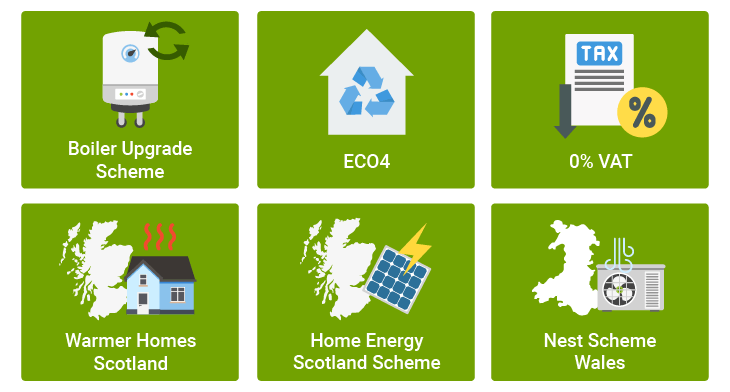
As you can see, heat pumps can be quite the investment. Thankfully, there are several grants that you could apply for to potentially lessen the financial burden of installing a heat pump.
These include: The Boiler Upgrade Scheme, The Energy Company Obligation (ECO4), Warmer Homes Scotland Scheme, Home Energy Scotland Scheme, and Nest Scheme Wales. You can also benefit from 0% VAT when installing a heat pump. Below is an overview of how much you can save on your heat pump installation with each of these grants:
| Financial Assistance With Heat Pump Grants | |
|---|---|
| Heat Pump Grant | Savings |
| Boiler Upgrade Scheme | Grant of £7,500 |
| The Energy Company Obligation | Grant of £7,000 – £20,000 |
| Warmer Homes Scotland Scheme | Interest-free loan of £10,000 |
| Home Energy Scotland Scheme | Interest-free loan of £15,000 |
| Nest Scheme Wales | Potential full coverage of heat pump installation costs |
| 0% VAT | Savings of up to £2,450 on installation costs |
Before starting the application process, make sure to check the eligibility criteria of each grant. For example, homeowners choosing heat pumps in Scotland have two regional grants available, Warmer Homes Scotland and the Home Energy Scotland schemes. In addition, those living in Wales can apply for the Nest Wales Scheme.
Heat pump grants in Northern Ireland are slightly different from those in the rest of the UK. For this reason, we highly recommend checking our article on heat pumps in Northern Ireland.
If you have more questions about these grants or heat pumps in general, then you’ll want to consult a reliable installer who can offer you tailored advice.
Most asked practical questions about heat pumps
Yes, a heat pump works well in the UK climate. This is because of the moderate winters that rarely reach extremely low temperatures. This aspect is particularly important for air source heat pumps, which rely on warm outside air to warm up your home.
Heat pump dimensions vary per manufacturer, but generally air source heat pumps are around 100-150 centimetres high and 50-100 centimetres wide. Ground source heat pumps are about 70 centimetres high and 40 centimetres wide. However, their groundwork takes up a lot of space, so you will need to account for about 700 square metres for your GSHP installation.
Generally, the existing pipework in a house can accommodate a heat pump installation without requiring major changes. However, only a heat pump installer can determine whether any adjustments need to be made.
Yes, heat pumps work with radiators. If you have an air to water heat pump or a ground source heat pump, these can also work with underfloor heating.
Not necessarily. However, if you want to use the energy generated by your heat pump to supply your taps with hot water, then you will need a water storage tank.
Finding a reputed heat pump installer near you on your own can be time-consuming and frustrating. Instead of spending hours on tedious research, let us put you in touch with up to 4 local heat pump installers vetted by us. All you have to do is fill in our 30-second form to receive free and non-binding heat pump quotes from each installer. You can then directly compare them and choose the best one. Click below to get started today!
- Quotes from local engineers
- Payment by finance available
- Save £7,500 with BUS grant
It only takes 30 seconds



- What is a heat pump and why use them?
- How does a heat pump work?
- Types of heat pumps
- How much do heat pumps cost?
- Heat pump efficiency
- Are heat pumps worth the investment?
- What are the pros and cons of heat pumps?
- Advantages of heat pumps
- Disadvantages of heat pumps
- What are the different types of heat pumps?
- Factors to consider to see if a heat pump is the right solution for you
- Find the best suppliers of heat pumps in the UK
- FAQ
What is a heat pump?
Heat pumps are versatile climate control systems that move heat instead of generating it. They extract heat from a source like the outdoor air (air-source) or the ground (ground-source) and transfer it indoors for heating. They can even be reversed in the summer to extract heat from your home for cooling.
How does a heat pump work?
A heat pump utilises a process of moving heat from the outside to the inside. The heat pump diagram below gives a clearer picture of how a heat pump operates. Here’s how it happens in 6 steps:
- Absorbing heat from outside: A heat pump collects warmth from the outside, which it uses to turn refrigerant, in its pipes, into vapour.
- Bringing heat inside: The gathered vapour is compressed to heat it further, and transported into your home, releasing heat.
- Releasing heat indoors: The super-hot gas passes its heat to your central heating system, warming up the area. During this step, the vapour transforms back into a liquid.
- Cooling down liquid: This liquid passes through a special valve, rapidly cooling it down to prepare for absorbing the outside heat.
- Optional cooling: Alternatively, the heat pump can reverse the process. It takes warmth from the inside and releases it outside, similar to opening a window to let out warm air.
- Continuous cycle: The heat pump maintains a repeating cycle, either bringing warmth in to heat your home or moving warmth out to cool it down.
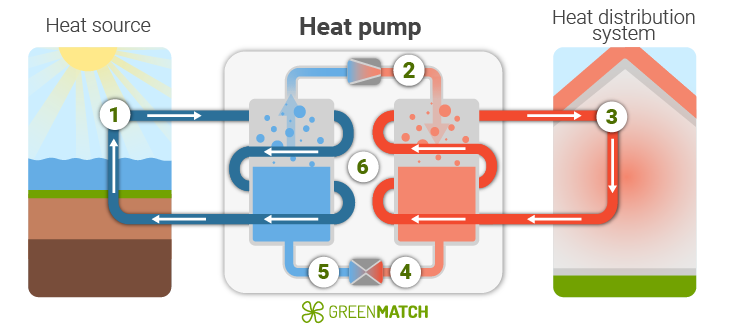
Types of heat pumps
There are three heat pump types: ground-, air-, and water-source heat pumps. When the heat source is the soil, we talk about ground source heat pumps. Similarly, the ones using the ambient air or a body of water are called air source and water source heat pumps, respectively.
Read more about the specific heat pump types below:
Hybrid heat pumps are another popular heat pump option for homeowners with high heating demands. A hybrid heat pump, also called a dual fuel system, works by switching between the two energy sources (a heat pump + boiler combo) based on the season, temperature, and function needed for maximum efficiency and effective heating and cooling.
An average hybrid heating system costs anywhere between £7,000–£15,000 and around £6,000 to have it installed.
Aside from connecting to central heating systems, air source heat pump underfloor heating is another option. Air source heat pumps can also be used as heat pumps for flats. You may also decide to install a high temperature heat pump, which can reach temperatures between 60°C to 80°C, heating your home to levels comparable to a conventional gas boiler.
How much do heat pumps cost?
Air source heat pumps costs usually start from £2,400 and go up to £12,350, not including installation costs. Meanwhile ground-source heat pump costs are typically between £13,200 to £19,000. Including installation costs, prices can reach up to £49,000 for a vertical groundwork installation. The running costs of heat pumps in the UK depend on your household, its insulation properties, and size.
| Heat Pump Costs | ||
|---|---|---|
| Heat Pump Type | Estimated Supply Cost | Average Yearly Running Costs |
| Air to air | £2,400 - £8,800 | £650 - £1,050 |
| Air to water | £8,400 - £12,350 | £730 – £1,795 |
| Ground source | £13,200 - £19,000 | £740 – £1,270 |
| Water source | £6,000 – £11,000 | £1,300–£1,700 |
These are just approximate prices. Wondering about heat pump costs for your specific needs? Avoid the lengthy search for an installer by using GreenMatch.
Complete our 30-second form, connect with up to 4 nearby installers, and compare quotes to ensure you get the best deal – all for free and with no obligations. Start now by clicking below.
- Quotes from local engineers
- Payment by finance available
- Save £7,500 with BUS grant
It only takes 30 seconds



Heat pump efficiency
How efficient are heat pumps? Heat pumps stand out with their potential for up to 400% efficiency through heat energy recycling from air, water, or the ground. Due to this, heat pumps exhibit significantly higher efficiency compared to traditional heating methods like gas boilers or electric heaters.
If you consider the efficiency of heat pumps vs boilers, heat pumps are up to 4 times more efficient. On average, boilers can offer up to 92-100% efficiency, and electric heaters are theoretically 100% efficient.
| Heating system | Efficiency |
|---|---|
| Heat pump | 300-400% |
| Boiler | 99-100% |
| Electric heater | 100% |
Are heat pumps worth the investment?
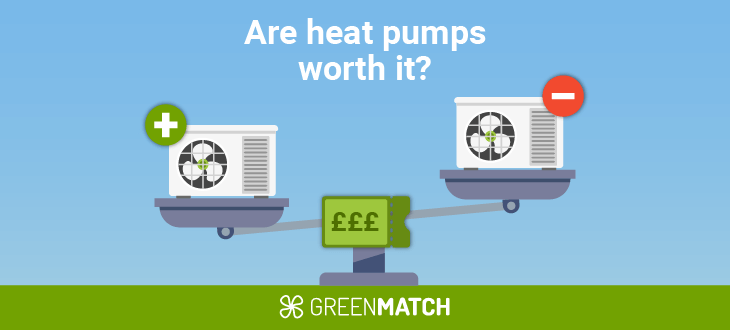
Heat pumps represent a smart investment in the long run. Given that you can save on your energy bills and the government can provide you with financial support, heat pumps are absolutely worth it.
With the new heat and buildings strategy coming up, it is expected to further increase the installation of various heat pumps as a low-carbon heating solution.
The table below shows the potential savings you could have by replacing your old heating system with an air source or ground source heat pump:
| Heat Pump Savings | ||
|---|---|---|
| Type of Heat Pump | Estimated Annual Savings | Break-Even Point |
| Air source heat pump | Up to £1,200 | 7 - 12 years |
| Ground source heat pump | Up to £2,000 | 12 - 18 years |
And, depending on your current situation, the repayment time can be drastically shorter than the lifespan, making it a worthy investment. Even though the consensus is that heat pumps are a good investment, this doesn’t mean that you should overpay on the upfront costs.
Ensure you get the best deal on your heat pump installation and save time finding reliable installers by comparing quotes. Fill out our 30-second form and Up to 4 local qualified installers from our network will offer free installation quotes with no obligation to commit until you're ready. Click below to begin.
- Quotes from local engineers
- Payment by finance available
- Save £7,500 with BUS grant
It only takes 30 seconds



What are the pros and cons of heat pumps?
Let's take a look at the advantages and disadvantages of heat pumps in detail, to help you make an informed decision and make a wise investment towards this low-carbon heating technology.
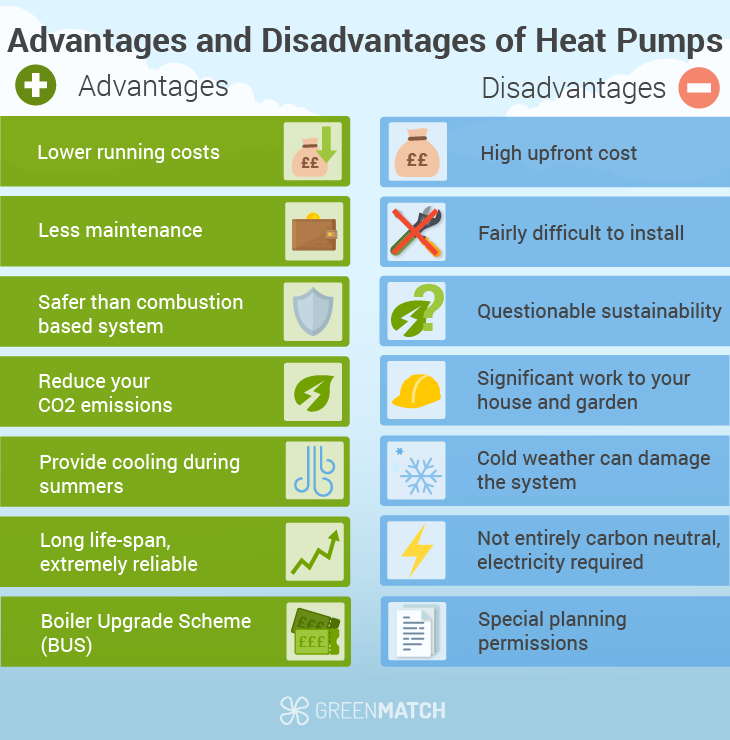
Advantages of heat pumps
Heat pumps can be a fantastic choice for your home in many ways. Listed below are some of the advantages you can get by installing a heat pump.
Heat pumps can be a fantastic choice for your home in many ways. Listed below are some of the advantages you can get by installing a heat pump.
- Cost-effective operation: Heat pumps are more budget-friendly than combustion-based systems, offering potential annual savings of up to £2,000, despite some upfront costs.
- Quiet operation: If you're wondering: "Are heat pumps noisy?" you'll be glad to know that heat pumps don't produce noticeable noise levels. What is more, most modern heat pump manufacturers prioritise quiet operation in their models.
- Low maintenance: Heat pumps require minimal maintenance, typically checked annually by the homeowner, and professional inspections are only necessary every 3 to 5 years.
- Enhanced safety: Heat pumps are considered safer than combustion systems as they don't rely on burning fuel for heat production.
- Reduced carbon footprint: Heat pumps efficiently convert energy into heat, significantly lowering carbon emissions, with some models achieving nearly 600% efficiency.
- Cooling capability: Heat pumps can switch to cooling mode during hot weather, functioning as air conditioning units, especially air-to-air heat pumps.
- Longevity: Heat pumps have a lifespan of approximately 15-20 years, offering reliable, long-term heating solutions.
- Boiler Upgrade Scheme: The UK's Boiler Upgrade Scheme provides financial incentives of up to £7,500 for air source heat pumps and ground source heat pumps, promoting the adoption of low-carbon heating systems. This makes an air source heat pump installation cost equivalent to getting a new boiler.
Heat pumps are one of the most efficient home heating solutions available. However, there are some drawbacks to weigh in when choosing a heat pump.
Disadvantages of heat pumps
Heat pumps are one of the most efficient home heating solutions available. However, there are some drawbacks to weigh in when choosing a heat pump.
- Costly upfront investment: Heat pumps do bring long-term energy bill savings and reduced carbon emissions but the initial investment varies between £2,400 - £19,000 (excluding installation), which can be a significant disadvantage.
- Complex installation process: Prepare for detailed planning, involving heat movement considerations, local geology, and your heating/cooling needs.
- Environmental concerns: Heat pumps aren't entirely carbon-neutral due to electricity usage and some of the used fluids for heat transfer raise environmental concerns. Therefore, it is recommended to use biodegradable fluids or renewable energy sources like solar for true carbon neutrality.
- Significant house and garden disruption: During the installation, the building cladding might need to be penetrated causing potential inconveniences.
- Weather-driven reduced efficiency: If you were wondering: "Do heat pumps work in cold weather?" then it's important to note that cold weather may reduce the efficiency and increase the electricity consumption for air source heat pumps. Ground source heat pumps, on the other hand, aren't affected significantly by cold weather.
- Mandatory planning permissions: Special planning permissions are necessary for heat pumps in Wales and Northern Ireland, with England and Scotland requirements contingent on property size and location.
Is a heat pump the right choice for your UK home?
When considering a heat pump for your UK home, it's essential to factor in several key considerations. These include selecting the right air source heat pump size based on your space and climate, prioritising high-efficiency ratings, and choosing a reputable brand with warranties.
If you still can't make up your mind about whether a heat pump is something your home could benefit from, you need to take the following steps:
- Understand how a heat pump works – find out what heat pump types there are and how to choose the right one for your home.
- Find out whether your home is suitable for a heat pump – consider its age, whether it's insulated or not, whether it has single, double or triple glazed windows, and how many bedrooms there are.
- Consider the pros and cons of heat pumps – whether the upfront heat pump investment fits your budget or whether your home can accommodate an air source or a ground source heat pump.
Find the best suppliers of heat pumps in the UK
Heat pumps, whether ground source, air source, or water source, represent excellent opportunities for upgrading your home, as they not only provide you with a solid return on investment but also improve the quality and value of your home.
Avoid days of stress and hassle, searching for installation quotes, by using our easy service. Fill out our quick form, and within 48 hours, we'll connect you with up to 4 local installers tailored to your home's needs, saving you time and money. Comparing local quotes helps you secure the best deal and avoid overpaying for supply and installation.
- Quotes from local engineers
- Payment by finance available
- Save £7,500 with BUS grant
It only takes 30 seconds



FAQ
The electricity consumption of a heat pump depends on several factors, including its size, efficiency, operating conditions, and the climate in which it is used. To get a precise estimate of how much electricity a specific heat pump will use in a particular application, it’s best to consult a professional heat pump installer.
During winter, heat pumps extract heat from the outdoor air using refrigerant, which is then transferred indoors and distributed through the indoor unit’s fan or blower. To ensure winter efficiency, regular maintenance such as cleaning the filter, clearing debris from the outdoor unit, and avoiding obstructions is crucial.
Yes, most heat pumps work with whatever type of radiator you have at home (the main exception to this is air to air heat pumps, which don’t require radiators at all). However, remember to consult a heat pump installer regarding radiator compatibility with heat pump systems, particularly flow temperatures, and consider alternative low-grade heat distribution options like underfloor heating for optimal performance.

Attila was the Front-End Developer at GreenMatch. He holds a degree in international marketing and has several years of experience in web development and user experience. Attila likes to write about solar energy, heating technology, environmental protection, and sustainability. His and his team’s articles appeared in well-known sites such as The Conversation, Earth911, EcoWatch, and Gizmodo.
We strive to connect our customers with the right product and supplier. Would you like to be part of GreenMatch?

- Complete Guide to Heat Pumps in the UK (2024)
- What is a heat pump and why use them?
- How does a heat pump work?
- Types of heat pumps
- How much do heat pumps cost?
- Heat pump efficiency
- Are heat pumps worth the investment?
- What are the pros and cons of heat pumps?
- Advantages of heat pumps
- Disadvantages of heat pumps
- What are the different types of heat pumps?
- Factors to consider to see if a heat pump is the right solution for you
- Find the best suppliers of heat pumps in the UK
- FAQ
- Quotes from local engineers
- Payment by finance available
- Save £7,500 with BUS grant
It only takes 30 seconds




